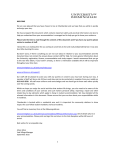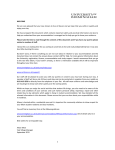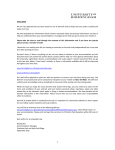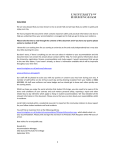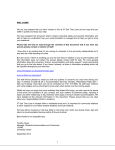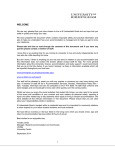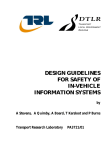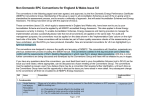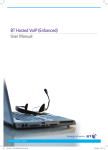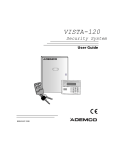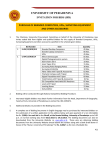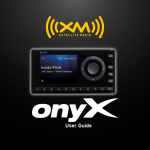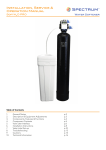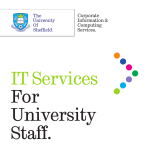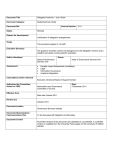Download 3, 7, 9, 11 Pritchatts Road (PDF-1MB)
Transcript
WELCOME We are very pleased that you have chosen to live at Pritchatts Road Houses and we hope that you settle in quickly and enjoy your stay. We have prepared this document which contains important safety and practical information and also to help you understand how your accommodation is managed and to help you get to know your residence. Please take the time to read through the contents of this document and if you have any queries please contact a member of staff. I know this is an exciting time for you coming to university to live and study independently but it may also be a little daunting for some. But don’t worry, if there is anything you are not sure about in relation to your accommodation and this document does not contain the answer please contact staff for help. For more general information about the University, registration, finance, accommodation and study support I would recommend that you go to the two links below, if you haven’t already, as there is information available which will be important throughout your time here. www.birmingham.ac.uk/welcome/index.aspx www.as.bham.ac.uk/support/ Our staff will be pleased to assist you with any queries or concerns you may have during your stay. Site Staff are on duty daily and can be contacted at reception on your mobile by calling 0121 414 9022. All staff wear uniforms and name badges and we should get to know each other quickly over the coming weeks. Whilst we hope you enjoy the social activities that student life brings, you also need to be aware of the terms and conditions of your contract and such matters personal safety, reporting a repair and other related day to day elements which apply to living in student accommodation. Please ensure that you are clear about your responsibilities whilst in residence. Pritchatts Road is a residential area and it is important for community relations to show respect for your fellow student and local residents. You will find an inventory form at the following address: www.birmingham.ac.uk/students/accommodation/OfferpackInformation.aspx which details what is in your accommodation. Please print and sign this and return to Pritchatts Park Reception within 48 hours of arrival. Best wishes for an enjoyable stay. Brynda Kirk Accommodation Manager, Pritchatts Park and Selly Oak Village September 2015 1 INTRODUCTION 1. What is the Universities UK (UUK) Code of Practice? The Housing Act 2004 introduced licensing for houses in multiple occupation in England and Wales. The Housing Act stated that licensing would apply to student accommodation which replaced the previous system of registration, from which Higher Education Institutions were exempt. The University of Birmingham played an active role in the consultation exercise for the draft UUK Code of Practice. We fully support the principles of the Code for the provision and management of our student residences and signed up to the UUK Code in December 2005 The Code has been prepared primarily to assist managers, and anyone involved in the management of student accommodation by setting out the main elements of good management practice. It is intended that the Code establishes a set of standards and undertakings about our management practices and the relationship between the University of Birmingham and yourself throughout your stay with us. It covers, among other matters, health and safety, maintenance and repair, and relationships between managers and you, our student tenant. It also should assist you to understand both the standards and procedures applying to your accommodation and your obligations as a resident. The Code has been designed with regard to the particular characteristics of student accommodation and to management practice in the higher education sector. Administration arrangements for the Code are set out in this document. These are intended to serve the overall purposes of the Code. These help to maintain and enhance standards and to set out clearly what you may expect of your accommodation and its management. These detailed arrangements also provide mechanisms for identifying, and helping remedy, any shortcomings in the management of your accommodation. Where an audit and/or complaints indicate a persistent management failure a University may be deemed to be no longer compliant with the UUK Code of Practice. Arrangements for the management of student accommodation, prior to the introduction of the Code of Practice, varied considerably between universities and the range of professional Higher Education bodies involved in giving information and advice on one or other aspect of housing provision and management of student accommodation. The Code outlines best practice and provides benchmarks for the management and quality of student housing in the Higher Education sector. A full version of the UUK Code of Practice is available to download at www.universitiesuk.ac.uk/acop/ and more details about the Code is available at www.thesac.org.uk/ The Code is concerned with the main principles and essential requirements for well managed student accommodation and the index below provides hot links to each section: 1. 2 2A Introduction Health and Safety Standards and Procedures Fire Safety 2 2B 2C 2D 3 4 5 6 7 8 Electricity and Gas Supplies Security Kitchen and Food Hygiene Internet Facilities Maintenance and Repairs Environmental Quality, Energy Saving and Recycling Landlord and Tenant Relationship Student Support and Student Mentor Scheme Anti-Social Behaviour and Disciplinary Procedures Each of the above elements are detailed under the relevant sections below. However, some of the information referred to may be held at your Village Reception or in the Estates Office and instructions will be provided under the relevant heading of how you can obtain this information. If you have any queries or concerns about your accommodation then please contact the reception on your Village where staff will be more than happy to assist you. 2. Health and Safety Standards and Procedures General This Statement is extracted from the University's full Health and Safety Policy Statement which also details the organisation and arrangements for implementing and monitoring the Policy. The full policy statement is available at https://intranet.birmingham.ac.uk/hr/wellbeing/worksafe/documents/policy/hspolicies.aspx 2.1 Policy Statement 1. The University of Birmingham, as an employer, is committed to providing and maintaining a healthy and safe working environment for all its employees, students and any other people who may be affected by its activities. The overall responsibility for ensuring implementation of this policy lies with the University of Birmingham; that is the University Council and the ViceChancellor as its Chief Executive. 2. This statement applies to all premises and activities within the control of the University. The University has made detailed arrangements for implementing this policy outlined in a further section of the Policy entitled, Organisation and Arrangements. 3. In order to achieve this aim the University has the following key objectives: as a minimum, to comply with requirements of relevant legislation; to identify hazards (the potential for harm), assess risks (the likelihood of that harm being realised) and manage those risks; to ensure that employees, students and others are adequately informed of the identified risks and where appropriate receive instruction, training and supervision; to consult with employees' representatives on health and safety matters; to make arrangements for co-ordination and co-operation with other employers where: 3 University employees or students share premises, facilities or activities with persons working in other organisations; persons from other organisations are working in University controlled activities; to safeguard the environment from the effects of the University's activities; to monitor and review the effectiveness of the University's arrangements and where appropriate to implement improvements. to ensure that the demands of activities do not exceed the capabilities of staff or students to carry out the work without risk to themselves or others. 4. The Heads of Budget Centres are responsible for ensuring compliance with University Health and Safety Policy within their area of control. Heads of Budget Centres are required to produce annual health and safety action plans summarising key objectives and timescales. 5. The University will actively monitor the performance of Budget Centres in the management of risks under their control and the implementation of Budget Centre health and safety action plans. 6. Whilst the University accepts the main responsibility for implementation of this policy individuals have an important role in co-operating with those responsible to ensure a healthy and safe working environment. Individuals are required to abide by rules and requirements made under the authority of this policy. Vice-Chancellor Hospitality and Accommodation Services Health and Safety Policy To view the HAS Health and Safety Policy please go to www.birmingham.ac.uk/undergraduate/accommodation/Living-with-us/Codeofpractice.aspx 2.2 Risk register The University Health and Safety Policy requires Heads of Budget Centres to ensure that risk assessments are carried out for all activities under their control. “Heads of Budget Centres must ensure that risk assessments are carried out for all activities under their control as required by current University Policies and that appropriate action is taken to eliminate or control the risks identified.” Once a risk assessment has been completed the documentation is kept in a local Risk Register located in the Village reception which is available to view by appointment. If you have concerns regarding risk assessments please contact a member of Pritchatts Park staff 4 2.3 Emergencies including first aid or calling for the emergency services IN THE EVENT OF AN EMERGENCY ON THE CAMPUS (In the case of FIRE sound the alarm first) IMMEDIATELY, TELEPHONE SECURITY CONTROL ON 44444 OR Use one of the Emergency Phones linked to Security Control Do not telephone the Emergency Services direct. This will be done by Security Control IN THE EVENT OF AN EMERGENCY OFF THE CAMPUS (In the case of FIRE sound the alarm first) IMMEDIATELY, TELEPHONE THE EMERGENCY SERVICES ON 999 AS SOON AS POSSIBLE, TELEPHONE SECURITY CONTROL ON 414-4444 Emergencies include: FIRE, ACCIDENT, ILLNESS, POLICE ASSISTANCE, BOMB THREATS, UNSAFE BUILDINGS, ETC. Emergency phones locations: 1. Elms Road on the corner of the ACS Building 2. South West Campus, Terrace Huts, Sportex Building 3. South Car Park, first floor pedestrian exit, at the rear of the Guild of Students Building 4. University Square, outside Arts Building main entrance (Press button and speak direct to Security Control) EMERGENCY ACTION (ACCIDENTS AND ILLNESS) MAIN CAMPUS In the event of MAJOR ACCIDENT/ILLNESS 1. Check safety - do not put yourself at risk 2. Maintain clear airway 3. Summon Help - see First Aiders listed below Or Dial 44444 - Security 4. Control bleeding 5. Move the casualty as little as possible LOCAL HOSPITAL Queen Elizabeth Hospital Mindelsohn Way Edgbaston Birmingham B15 2WB 0121 627 2000 5 If you sustain any minor injury, the correct procedure is for you to see an appointed First Aider in order that appropriate action can be taken and the necessary records made. A list of First Aiders is available at Pritchatts Park reception 2A. Fire Safety 2.4 Prevention ALWAYS: REPORT ANY BLEEPING DETECTORS TO RECEPTION IMMEDIATELY REPORT FIRES OR USE OF EQUIPMENT IMMEDIATELY TO RECEPTION REPORT SMOKE OR HEAT ALARM ACTIVATION IMMEDIATELY TO RECEPTION MAKE SURE YOU USE THE EXTRACTOR FAN WHENEVER YOU ARE COOKING NEVER COVER DETECTORS LEAVE COOKING UNATTENDED REMOVE THE BATTERY FROM THE DETECTORS MISUSE OF FIRE FIGHTING EQUIPMENT OR TAMPERING WITH FIRE ALARMS will put yourself and others at RISK– disciplinary action may be taken as detailed in Clause 2a of your Accommodation Contract. CLOSE THE GRILL DOOR WHEN IN USE USE FOIL IN GRILL PAN LEAVE FAT or OIL IN GRILL PAN AFTER USE PROP OPEN FIRE DOORS WITHIN FLAT USE CANDLES IN YOUR ACCOMMODATION STORE FLAMMABLE MATERIAL OR LIQUIDS IN THE FLAT USE HALOGEN DESK LAMPS Please note, there will be charges applicable for the abuse of fire regulations, e.g. for covering up a smoke or heat detector, propping open fire doors or leaving cooking unattended. www.direct.gov.uk/en/HomeandCommunity/InYourHome/FireSafety/index.htm 6 2.5 Fire detection and alarm Your studio has a combined heat/smoke detector. These are mains operated, backed up by a battery in case of power failure. The studio alarms are linked which means if one alarm goes off it will activate all the alarms in your house and also notify University Security Control (Main campus) who will contact the Emergency Services immediately. 2.6 Fire alarms, fire-fighting equipment, emergency lighting, emergency secondary power supplies, fire door integrity and door release mechanisms are regularly checked and tested in accordance with the appropriate British Standard. A record of these checks is maintained by the University’s Estates Office. ALWAYS TREAT AN ALARM ACTIVATION AS A POTENTIAL FIRE AND NOT A FALSE ALARM IT COULD SAVE YOUR LIFE! If your studio alarm is activated by a fire or any other reason always contact a member of Pritchatts Park staff ACTION IN THE EVENT OF A FIRE 1. RAISE THE ALARM BY BREAKING THE GLASS IN THE NEAREST FIRE ALARM POINT. 2. DIAL 44444 on the nearest telephone and give details to Security control including I. the location of the fire II. some indication of its extent III. whether the occupants of the building are in any danger 3. If you have been trained to do so and without putting yourself at risk, attack the fire with extinguishing equipment provided 4. EVACUATE THE FLAT For more details on what to do in an emergency, emergency action in relation to accidents and illness on main campus go to https://intranet.birmingham.ac.uk/has/security/Who-to-contact-in-an-emergency.aspx TESTING REGIME The following are regularly tested to the appropriate British Standard by the Estates Office Emergency lighting Emergency secondary power supplies, such as battery back-up systems Fire door integrity including closures 7 Automatic door release systems Emergency escape ironmongery, such as push bars 2. 7, and 2. 8. ESCAPE Fire evacuation practices will be conducted at the start of each academic year and you will be informed of when these will take place soon after you move in. If you are unsure please ask a member of Village staff for details. To evacuate your house you must leave via the ENTRANCE door. Proceed down the stairwell (if you are not on the ground floor) and go to the assembly point in front of the building It is important that the corridors and stairwells are kept clear of rubbish or obstructions at all times, safe egress will be monitored regularly by staff. Deliberate obstruction by rubbish or other items will be seen as a major breach of Health and Safety regulations and disciplinary action may follow RULES FOR EVACUATION YOUR RESPONSIBILITIES Fire evacuation practices will be conducted at the start of each academic year and you will be informed of when these will take place soon after you move in. It is your responsibility to ensure that you attend this important session. ACTION TO TAKE ON HEARING THE ALARM 1. 2. leave the buliding by the shortest and safest route Go to the assembly point which is: In front of the building 3. 4. 5. DO NOT STOP TO COLLECT BELONGINGS DO NOT RE-ENTER THE BUILDING Follow the instructions of the staff on duty OUR RESPONSIBILITIES Pritchatts Park staff will, provided these duties do not endanger their own safety 1. 2. 3. Supervise the evacuation and report details of the incident to the University Security Control Stop re-entry to the building until the Fire Service arrive Ensure that the Fire Service have vehicular access onto the site 8 2.9 Personal evacuation plans Residents are encouraged to disclose details of any disability which may affect their ability to complete a safe evacuation in an emergency and thus require assistance from Village staff. We would encourage you to advise us of any relevant disability to enable staff to prepare a personal emergency evacuation plan (PEEP) for you. Why would you need a personal emergency evacuation plan? A Personal Emergency Evacuation Plan (PEEP) is designed to ensure the health and safety of yourself should an emergency situation arise that requires building evacuation (e.g. fire alarm activation, bomb threat). This plan is usually unique to yourself and stipulates the actions you will need to take and any requirements that staff will need to be aware of should an emergency arise. It will cover all buildings you are likely to occupy whilst in the accommodation. If this is something you would like to discuss in confidence please contact the Village reception staff 2. B. ELECTRICITY AND GAS SUPPLIES 2.10 General Pritchatts Road Houses have a gas and electricity supply. Please be aware UK STANDARD VOLTAGE IS 230v 50HZ Except in the case of emergencies or essential maintenance works electrical supply will be maintained without interruption. 2.12 Gas Installations All gas supplies, distribution pipe work and gas fired appliances comply with the relevant gas safety regulations. 2.13 All gas appliances in Student Accommodation, such as boilers, have an annual gas safety check undertaken by a Gas Safe registered gas installer. These tests are coordinated by the Estates Office and you will find a copy of the current gas safety check displayed near the ground floor entrance door in your accommodation. Control of Gas Boilers for the provision of heating and hot water 2.14 Bedroom Heaters Radiators are installed in all studios. These radiators can be controlled since they have a thermostatic value and can be shut off by turning the valve clockwise. The system is a gas fired boiler situated in the house which residents have no access and should any faults occur they should contact Pritchatts Park staff. 9 The boiler is timed to come on certain times and can be set by Estate Management depending on how cold it may be. This boiler also provides constant hot water to the house. 2.15 Electrical Installations Guidelines Do not use any appliance rated at any other voltage especially 110V as this is a serious Health and Safety risk and may result in disciplinary proceedings You must check that your own electrical appliances are made to British Standard and are wired correctly. Seek advice from Village staff if you are unsure. The University reserves the right to remove any unsafe or faulty electrical appliances found in your Accommodation. Students can reclaim these from the Village Manager when they move out of the Accommodation. When using personal electrical equipment i.e. Kettles, Toasters, Hairdryers etc… Please make sure that you follow the guidelines below: All personal electrical equipment must be serviceable - this includes connecting cables and plugs. The use of halogen lamps is not permitted under the terms and conditions of your Accommodation contract. Plugs must be wired in the correct manner and fused according to the manufacturer's instructions. One plug must supply one appliance only. Cables must not trail across the floor. If extension leads or long cables are used, these must be placed neatly so as not to cause a trip hazard. DO NOT place containers of liquid near electrical equipment. Report any broken/faulty electrical sockets to reception immediately. You are responsible for any electrical equipment you bring into your flat. The University takes NO RESPONSIBILITY for damage or injury caused by personal equipment in your Accommodation. To make sure that the electric circuits to your flat do not 'TRIP OUT' i.e.: switch off, please comply with the following: Do not use more than one rice cooker at the same time Do not use voltage adaptors purchased overseas Do not use a light bulb with a wattage in excess of 60 watts Do not use dirty appliances 10 We advise you DO NOT buy re-conditioned electrical items without having a Portable Appliance Test (PAT) carried out and displaying the appropriate certification on it. 2.16 Electrical safety certificates All electrical installations within Student Accommodation are inspected and tested in accordance with the IEE Regulations, currently at least every 5 years, and the results are recorded in an appropriate register held by the Estates Office. General Information relating to UK electrical power supply UK standard plugs have three rectangular pins that form a triangle. British Standard BS 1363 requires use of a three-wire grounded and fused plug for all connections to the power mains (including Class II, twowire appliances). UK power outlets incorporate shutters on line and neutral contacts to prevent someone from pushing a foreign object into the socket, such as a 2 pin plug. Almost everywhere else in the world a spur main system is used. In this system each wall socket, or group of sockets, has a fuse at the main switchboard whereas the plug has none. So if you use a foreign appliance in the UK, you must use an adaptor that incorporates the correct value fuse. Note most would have a 13 amp as standard. 2.17 Electric Heating Not applicable, please see 2.14 for instructions on central heating and hot water provision. 11 12 13 14 15 16 17 18 19 20 21 22 2.18 Portable Appliance Testing (PAT) What is PAT? Portable Appliance Testing requires that all portable appliances with a mains plug need to be tested to ensure that they are safe and fit for purpose. Appliances include, but are not restricted to, the following examples: Computers, monitors and peripherals requiring mains power Audio and telephone equipment requiring mains power Kettles, microwave ovens and other kitchen appliances Vacuum cleaners Extension leads Any portable appliances supplied by, or used in the premises by University staff, are inspected and maintained in accordance with the University’s Electrical Safety Policy. This can be viewed at https://intranet.birmingham.ac.uk/hr/wellbeing/worksafe/topics/electrical.aspx 2.19 It is a requirement that you should keep your Accommodation clean and tidy so as to provide reasonably safe environment for all staff who may have to enter your Accommodation, as detailed in Clause 5 b in your Accommodation contract 2.20 Clause 3 b of your Accommodation contract details the procedure for dealing with any potentially dangerous personal electric equipment in your Accommodation. 2.21 Water Supplies General All studios are supplied with separate hot and cold running water to appropriately marked taps. The cold water supply is drinkable. It is advised if you have been away from your residence for more than a few days that you turn on the cold water supply and let it run for a little while before use. If any supply is deemed to be undrinkable this will be clearly marked as such. 2.22 Waste water All waste water is removed via an appropriate trapped connection to the sewerage system. 2.23 Water hygiene All hot and cold water supplies are maintained in accordance with current Health and Safety executive guidelines. Anti-Legionella work, cleaning of shower heads and testing water temperatures is regularly undertaken as part of a planned maintenance programme by the Estates Office in accordance with HSE and statutory public health requirements. 23 2.24 Lighting Lighting is provided in accordance with the Chartered Institute of Building Service Engineers (CIBSE) recommendations. If you have any queries regarding lighting levels please contact reception who will try to resolve any concerns you may have. 2C. Security 2.25 Building and room security A CCTV system is installed at Pritchatts Park with 22 cameras positioned around the site to give full coverage of the boundaries and landscaped areas. Images are recorded continuously and the cameras are monitored from Pritchatts Park reception. Please notify a member of staff if you have any concerns regarding security. Always make sure you lock your studio door before leaving the building. Staff will contact residents if doors are found open. 2.26 All windows to your building are lockable and fitted with stops to prevent over-opening. Access to the Village launderette within Pritchatts House is accessed using your student identification card. Staff at Pritchatts Park try to ensure that the site is as safe as possible, however, although there is a member of staff on duty daily they may not always be on site. It is therefore the responsibility of every resident to follow the above recommendations to help maintain a safe environment for residents. Pritchatts Park respects your privacy and 24hrs notice will be given to residents whenever possible regarding access to rooms (Exceptions in emergency situations or when other residents may face Health and safety issues or suspected criminal activity). A log is kept of room access dependent on the circumstances, if you think someone has entered your room without authority please contact reception immediately. You have signed for a building key and a studio key. They are your responsibility and must not be passed on to friends or visitors. Always keep the doors locked and your keys with you. You should lock your studio door when you leave. Help us to keep Pritchatts Park a safe and secure environment for all residents and staff. 2.27 Security Personnel University security staff are identifiable by their corporate uniform and all wear University ID badges. All security staff have been vetted by the current and relevant legislation. 24 Campus Security Security Control Room Tel: 0121 414 3000 from your mobile or e-mail: [email protected] Confidential Crime Line Tel: 0121 414 7500 from your mobile Emergencies Tel: 0121 414 4444 from your mobile Location Security are based in the Security Centre Building, which is situated between Aston Webb 'B' Block and the Great Hall (building number R3 on the campus map) and can be reached either from the Aston Webb semi-circle lower ground floor or directly off the ring road. Security policy Security will almost always be the first public face of the University of Birmingham that a visitor will see. Therefore, the Section works to the principle of providing a welcoming, friendly and helpful service to visitors and others entering the campus. Security provides the first line of protection for the people, the buildings and the land of the University. It encompasses all aspects of the University's day to day business on and off site. Security maintain a 24-hour, 365 days a year presence throughout the Edgbaston and Selly Oak campuses, all main student residences and some non-residential outlying properties. Security provides this coverage through 5 teams working a continuous shift system, in contact with their base via radio. For more information relating to University Security please go to www.has.bham.ac.uk/support/securityteam/ Security Plan For information on safety on campus and details of the University’s Emergency Management Plan please go to: www.birmingham.ac.uk/community/university-campus/security/index.aspx https://intranet.birmingham.ac.uk/has/Emergency-Planning-and-Management/Emergency-planning.aspx 2.29 Closed Circuit Television (CCTV) Policy and guidance The University has installed CCTV in this Village/residence where images are recorded continuously. You must not tamper with this apparatus. The University complies with current government standards regarding CCTV use and under the provisions of the Data Protection Act 1998, if you wish to see an image(s) of yourself you need to submit a “subject access request” in writing to the Information Compliance Manager in Legal Services. The Information Compliance Manager will decide whether the image(s) is/are still in existence and 25 whether to release the image(s). There is currently a charge of £10 for this service and you should include a cheque for £10 payable to “The University of Birmingham” with your “subject access request”. A copy of the University’s Data Protection Policy is available at www.birmingham.ac.uk/university/governance/policies-regs/data-protection.aspx A copy of the University’s Codes of Practice, including CCTV Code of Practice www.birmingham.ac.uk/university/governance/policies-regs/codes-practice.aspx 2D. Kitchen facilities, food storage, washing facilities, furnishings and other matters furnishing, cleaning routines and other matters 2.30 Kitchen and food hygiene advice The facilities within your studio should be maintained in good order and repair with all equipment supplied in working order. If when you move in you find that any item is defective or missing please record this on the Inventory Form which has been given to you and return to the Village reception within 48 hours of moving in. If you cannot find the form please go to www.birmingham.ac.uk/students/accommodation/OfferpackInformation.aspx and download a copy or call into the Village reception for another copy. Washing your hands is important Some germs can stay alive on our hands for up to three hours and in that time they can be spread to all the things you touch - including food and other people. So wash your hands regularly throughout the day and especially at these times. Remember germs spread more easily if hands are wet Always wash your hands before Preparing food Eating Always wash between: Handling raw foods (meat, fish, poultry and eggs) and touching any other food or kitchen utensils Always wash after: Handling raw foods, particularly meat, fish, and poultry Going to the toilet 26 Touching refuse/waste bins Coughing or sneezing, especially if you are unwell The number of germs on fingertips doubles after using the toilet KITCHEN AREA COOKER & EXTRACTOR HOT PLATE (top) When cooking, do not leave food unattended. After cooking, clean away any spillages removing any grease with a cloth or scourer and cream cleanser and rinse with a damp cloth Do not leave the cooker top dirty. Switch cooker off after use to prevent the risk of fire and save energy OVEN (bottom) Do Not shut grill door when in use Do not use aluminium foil in the grill pan Clean the grill pan in hot soapy water to remove grease after use - (excess fat or oil can catch fire) Never cook food on the metal racks in the oven without using an ovenproof dish, plate or tray Clean all spillages after use with a cloth or scourer and cream cleaner and rinse with a damp cloth EXTRACTOR (over cooker) Do not let grease or fat build up, clean regularly with warm water and cream cleanser and cloth MICROWAVE Do not use any metal container or aluminium foil inside when cooking. Clean all spillages after use with a cloth 27 FRIDGE/FREEZER Do not over fill fridge or freezer with food Throw away unwanted or out of date food regularly Defrost regularly, preferably at least once every term, which will ensure the appliance works efficiently to keep your food correctly chilled/frozen. Clean up any spillages inside and out with a cloth VACUUM CLEANER MOP & BUCKET DO NOT use a vacuum cleaner to clean up any liquid spillages (use a mop & bucket) Use a vacuum cleaner on all carpeted areas Remember to empty the vacuum cleaner bag regularly (see reception for replacement bags) Use a mop & bucket to clean vinyl flooring in the ensuite. WORK SURFACES AND SINK AREA After preparing meals, wipe all surfaces clean DO NOT leave worktops dirty. DO NOT put HOT pans straight on to worktops, dining table or window sills (damages will be charged for) Use rice cookers away from under wall cupboards, steam can cause damage to the cupboards Wash all crockery items after use, using washing up liquid, dry and put away in cupboards provided DO NOT pour grease, fat or food (rice & noodles) into the sink DO NOT leave sink, drainer, worktops cluttered with bottles, pans, jars REFUSE BINS Always use a bin liner in the kitchen refuse bin and keep the lid down to reduce smells Throw all waste food in refuse bin Empty refuse bin when full and place in external bins provided on site Wash bin inside and out after removing rubbish to sanitise Remember that rotting food waste will smell and cause germs. Remove from the kitchen area regularly 28 2.31 Food Storage Cold storage (fridge and freezer) is provided in your studio. Cooking on a Budget Shop Smart – make sure you don’t buy more food than you can use, stop waste and save your money Make a list and stick to it – only buy what you need and resist those special offers not on your list Buy basic ingredients and make your own meals – it is cheaper and healthier Say no to carrier bags – Reuse your carrier bags or buy some “bags for life” and use these each time you go shopping Shop seasonally and save on Food Miles. It is obvious that in the winter months you will pay much more for summer produce flown in from the other side of the world Plan your meals so you are not forced to throw away out of date food The average person in the UK throws away over £400 worth of perfectly good food each year 2.32 Toilet and Shower areas It is important you report any cracks in sanitary ware, or problems as soon as possible to maintain standards and prevent any Health and Safety issues developing. BELOW ARE SOME HELPFUL CLEANING TIPS TOILET Always flush toilet after use Toilet paper can be flushed down the toilet Clean inside the toilet with brush (provided) and toilet cleaner Clean toilet seat and exterior of toilet with a cloth WASH HAND BASIN Clean inside and out using a cloth or sponge and cream cleaner Clean under and around taps Ensure that plughole/outlet is free of hair( report to Reception if water not draining away) 29 Do not throw any food away (rice/noodles) down the sink. Clean tiled area and any shelving and mirrors SHOWER Clean shower or bath with cloth or sponge and cream cleaner after use Remove hair from plughole/outlet regularly (report at Reception if water not draining away) Regularly clean flooring, using an all purpose cleaner and red mop Please remember DO NOT use the following to clean your toilet, wash hand basin or shower BLEACH WASHING UP LIQUID SOAP POWDER These items will NOT help clean the above areas and may cause damage 2.33 Shower Controls Where fitted the outer ring can be rotated to provide different settings for the jets of water, from a full wide spray to a small firmer jet. The shower is operated by moving the lever anticlockwise until it reaches the coloured indicator marks. Blue is cool and red is hot. The more the lever is rotated anticlockwise the hotter the shower will be. 30 2.34 Furnishing quality When you move into your accommodation it should be clean and in good repair if you are not satisfied with the condition of your studio please indicate your concerns or defects on the Inventory Form or contact reception immediately All studios equipped with the following Bed Frame Mattress (Bedding is included) Wardrobe Desk and chair Notice board Bookshelf Lampshade Wastebin Set of coat hooks Data point* (connection to the high speed campus network) Cookers, microwave, fridge and freezer facilities are provided, as well as personal cooking utensils 2.35 Cleaning Your responsibilities You are responsible for cleaning your own studio Our responsibilities The stairwells & communal areas of the building are cleaned weekly The Launderette and Social Centre is cleaned daily Full service level agreement requirements regarding what and how the common areas and launderettes are cleaned is available at the reception for viewing. If you are not satisfied with the standard of cleanliness or experience any problems please report them to reception immediately. 2.36 Laundry facilities The Village launderette is located on the lower ground floor of Pritchatts House, and is accessed using your student identification card. Specific details regarding charges and how to operate the machines are provided in each launderette. DO NOT OVERLOAD the machines they will not work and refunds cannot be given. The launderettes are checked and cleaned each morning by Pritchatts Park staff. If you are not satisfied with the standard of cleanliness or experience any problems please report them to Reception 31 immediately. 2.37 Energy Included within your residence fees is an allowance to cover the average cost of providing utility services (gas, where applicable, electricity and water) to your Accommodation for the Accommodation Period based on the previous year's expenditure for your residence. We would ask you to be sensible with regard to your usage of these essential services to help reduce the impact on the environment and to help the University keep its carbon emissions and energy costs to a minimum. You should try to help us conserve energy and these resources or not use these services in a wasteful manner. We also reserve the right to make an additional charge to reflect a fair and reasonable proportion of the additional cost of utilities used in your Residence during the Accommodation Period over and above the allowance we already made within your residence fees. Should we have to make such an additional charge we will give you notice of the amount and a reasonable amount of time to pay together with a breakdown of the increased utility charges that the University is trying to recover a fair and reasonable proportion of. 2.38 Post and Mail Your address: House number, Pritchatts Road, Edgbaston, Birmingham, B15 2QU Letters will be delivered by Royal Mail directly to your house The University of Birmingham is unable to accept any registered letters or packages on residents behalf. When you leave Pritchatts Park at the end of the contract period, you need to ensure that your mail is redirected to your new address. Information on this and an application form are available from reception. 3. Internet facilities ASK4 provide Jarratt Hall residents with full wireless broadband access to the internet. To connect to the internet, please follow the instructions below For information on the services supplied by ASK4 including essential pre-arrival information, please visit by clicking the image To contact ASK4 with pre-arrival queries or assistance when you move in, call the support team on 0114 303 3232. Alternatively, text ‘help me’ to 07797 800 545 to receive a call back or email [email protected] 32 4. Maintenance and Repair Regimes 4.1 Approved contractors Where the University is directly responsible for repairs and maintenance these will be carried out by appropriately identified University employed staff or external contractors from the University’s approved list held by the Estates Office 4.2 Repair response times When you report a fault, it will be given a priority, which is based on the seriousness of the problem, as follows: Priority 1 Emergency: Response immediate Works if not carried out immediately will endanger the health and or welfare of staff, students, public etc. Examples: Failure of an essential service e.g. electricity, heating, emergency lighting to public areas, severe water leak or no lighting in whole flat - Immediate response Priority 2 Urgent: Response Within 24 hours Urgent or essential work which does not present an immediate threat as above, but which if not attended to within a 24 hour period could, or result in a call-out outside normal hours. Examples: No heating or hot water to specific areas, blocked storm or foul drains, no lighting to specific areas Priority 3 Response Within 5 Working Days Work if not carried out within 5 working days could result in the quality of the service provided, further deterioration or additional costs or inconvenience Examples: Overflowing external gutters, shower waste draining slowly or toilet seat loose or no power at socket, door re-hanging Priority 4 Response Within 10 Working Days Work of a non-urgent nature that can be planned in advance Examples: General plastering, tiling or replace cooker extractor bulb and most planned maintenance items 33 Priority 5 Response As Agreed With Users Work on a defect which has been programmed for a date in the future because access may not be available or awaiting parts Examples: Internal decoration programmed in to a planned maintenance schedule Please note the priorities above assume there is no urgent Health and Safety issue involved. In some cases the fault may be referred to the Estates Office or another outside contractor. When this is the case it may not be possible to meet the above response times. You will however be informed of any delays and if you have any concerns regarding timescales please contact reception. Repairs can be carried out when you are not in your studio with your permission and a maintenance calling card will be left giving you information on the completion of the repair. Reporting repairs Please report any faults or damage immediately to reception, either by phone, email or in person. Remember to make a note of the job number this will be required if you wish to raise a query regarding the repair. Although 90% of repairs are carried out by Pritchatts Park staff on occasions it may be necessary to pass the work on to the University’s Estates Office or an outside contractor if specific skills are required . This may delay response times, however, you will be informed if this is the case. When an outside contractor is required they will be supervised whilst in your Accommodation. Please do not authorise any contractors to do repairs without written permission from the Village Manager or you may be held responsible for paying the bill. If additional damage is caused to the Accommodation due to failure to report defects and repairs promptly, additional charges may be incurred for which you might be held responsible When you report a fault, it will be given a priority, which is based on the seriousness of the problem, as follows: P1 Severe water leak or no lighting in whole flat Immediate response P2 No hot water or no heating Response within 24 hrs P3 Shower waste draining slowly or toilet seat loose Response within 5 working days P4 Door banging or replace cooker extractor bulb Response within 10 working days P5 Replace filter in extractor or internal painting can be programmed in to a schedule Please note the priorities above assume there is no urgent Health and Safety issue involved. In some cases the fault may be referred to the Estates Office or another outside contractor. When this is the case it may not be possible to meet the above response times. You will however be informed of any delays and if you have any concerns regarding timescales please contact reception. 34 Repairs can be carried out when you are not in your room with your permission and a note will be left giving you information on the completion of the repair. 4.3 Maintenance All maintenance works should be undertaken so as not to inconvenience you. This will not always be possible with unplanned or reactive maintenance. For planned maintenance seven days notice should normally be given to you and endeavours will be made to avoid sensitive periods, such as during examinations. For urgent work the minimum notice period should be 24 hours unless an emergency requires immediate action. Pest Control If you have any concerns regarding pests in or outside of your accommodation please report these to the Reception and a specialist contractor will be instructed to attend to deal with appropriate treatment. The contractor will attend to investigate within 24 hours of the report being received and will carry out appropriate treatment for the pest or infestation Planned maintenance Testing offire detection equipment and emergency lighting are carried out most weeks on a Friday. Cleaning shower heads and testing water temperatures, as part of the University’s anti Legionella work, is carried out on a regular basis and you will receive written notification of each visit in advance. Some repair work identified by site staff will be carried out to buildings during the year. General Repair Information You may notice the above label in your flat or in buildings on the Edgbaston and Selly Oak campuses. The purpose of the labels is to advise any contractors who need to work in these locations to contact the Estates Office to seek appropriate information and advice before commencing any maintenance or repair work. In areas where there is a label present if you see signs of any damage to walls, ceilings or services please report this to the Village Reception immediately. 35 4.4 Construction quality All student residences have been properly constructed, altered or refurbished and maintained in accordance with the appropriate building, planning and housing legislation current at the time of construction. Relevant approval notices and certificates will be made available for inspection by prior arrangement by contacting your Village reception. 4.5 Grounds maintenance All planting and fences around residences will be maintained to be tidy and to minimise opportunities for concealment of intruders. Principal pathways and car parks should be hard paved (or have another suitable surface) Grounds maintenance is the responsibility of the University’s Grounds and Gardens Section. The presentation of the campus setting is down to their efforts and dedication. Covering both campuses, outdoor sports facilities, residential sites and outstations means they manage 180 hectares of land being responsible for grass cutting, planting, pruning, tree work, litter and road sweeping. In addition to this, 8000 annual bedding plants are replaced twice per year and oversee the interior planter contract. Their activities create up to 400m³ of green waste every year, which we recycle into compost. 4.6 Litter clearance Service Provision for the Landscape Maintenance provided by Grounds and Gardens Grounds will be regularly cleared of rubbish and litter picking will take place daily whenever possible (weather permitting). Students will be expected to behave responsibly and to avoid causing, or adding to, litter. The respective service level agreement is detailed below: Litter Picking and Sweeping a) All campus sites will be cleared of litter utilising a manual and mechanical means. All areas will be serviced and cleared in a priority order and the operators will also be responsible for the emptying of litterbins as required. b) All areas as detailed will be serviced on a daily/weekly schedule and the majority of this work will be completed during early mornings. c) All sites are constantly monitored on a daily basis. d) Any problems associated with the cleanliness of any external areas within the grounds should be reported to the office for the appropriate action. Details that may be required are description of problem and location. If you have concerns regarding litter or rubbish accumulation, please contact the reception. 36 4.7 Snow and ice clearance policy (Campus) Gritting, Salting and Snow Clearing a) We will provide a comprehensive gritting and salting service during periods of inclement weather; this will be actioned as required over all campus sites. Snow clearing will also be carried out in addition to the above as required utilising manual and mechanical means by direct labour and all contractors. b) All areas as detailed will be serviced on a prioritised schedule and the majority of this work will be completed during early mornings, while still reactive to prevalent weather conditions. Priority will be given to main routes to campus for emergency access, vehicles and pedestrians c) All areas will be monitored on a daily basis to ensure that the priority order is maintained and that all additional requests for assistance are serviced. Any problems associated with the clearance of external areas should be reported to the office for the appropriate action. 5. Environmental Quality 5.1 Energy efficiency We aim to ensure that your accommodation is suitably heated, ventilated and supplied with hot water and power, the cost of which is included within your residence fees based upon previous year’s consumption. The consumption of energy within the residences accounts for a fifth of the university’s total carbon footprint the impact of which has been reduce by a programme of upgrading the building stock, specify energy reduction projects, action by residences and supplying specific buildings with heat and power from onsite generation schemes. This has resulted in emissions per bed space reducing by 25% since 2005/2006 and will decrease further over the coming years (see further details below). We would ask you to be sensible with regard to your usage of these essential services to help reduce the impact on the environment and to help the University keep its carbon emissions and energy costs to a minimum. We do ask that you are prudent with your use of energy and do not waste an expensive (environmentally, socially and economically) resource by taking simple actions: Please only heat your room to the temperature required, 20°C should be plenty. Do not leave the windows open and the radiators on especially when you have left your room. Water is expensive to heat, thus only fill the kettle with the water required. For further information please contact staff on Reception or your Customer Service Manager 37 Adopting wise environmental behaviour is part of being a global citizen and is a skill and attitude you should take into your future professional and personal life. Carbon Reduction in residences There is an ongoing programme of upgrading the building stock which has seen double glazing, high efficiency condensing boilers and energy efficient appliances installed. A combined heat and power scheme has been installed in the Mason Energy Centre to provide heat and power Jarratt Hall is being refurbished in stages and the old electric heating replaced with heat supplied from the university’s combined heat and power scheme, which also supplies power to the building. High efficiency LED lighting has been installed in a number of residences including Jarratt, Shackleton, Ashcroft, Elgar Court, and the Spinney Photovoltaic panels have been installed on Centre Court with funding from the Residences Association. The fiscal benefits achieved will be used to fund further green projects (additional PV units are/will be installed in the Bio Hub, new library and the Sports Centre/Swimming Pool). Carbon Reduction in the University The University has committed to reducing its carbon footprint by 20% by 2020 and while close to achieving this objective today will need continued focus to accommodate expansion of activities. By recycling and cutting the amount of energy they use, residents can help us reach this target. For more information on the Carbon Trust go to www.carbontrust.com/home Concerned about climate change? Want to do your bit to help cut greenhouse gas emissions? If yes, why not start by being more energy efficient in your residence TODAY? In 2003 in the UK, the energy we used in our homes produced almost a third of the carbon dioxide emissions entering the atmosphere. Carbon dioxide is one of the main contributors to the man-made ‘greenhouse’ effect, where by heat from the sun is trapped in the atmosphere and results in an increase in the temperature of the Earth – global warming. The great news is that you don’t have to spend any money to help save energy and reduce carbon dioxide emissions. Saving energy will also help reduce fuel bills - you may not pay directly for these now, but may well do in the future when gas and electricity prices are even higher! 38 Follow these simple tips to save energy and money, now and in the future: Turn electronic equipment off standby and remember not to leave cordless phones on charge unnecessarily. More of us than ever have consumer electrical products like personal computers, DVD players, set top boxes etc. Households in the UK now spend around 10% of their electricity bill on standby power, wasting £37 each year. Do your bit and turn your computer, television, DVD player and all other electrical products off at the wall when not in use! NB: please check the user manual first. Only heat the amount of water you really need when boiling a kettle If we all did this instead of “filling” the kettle every time, we could save enough electricity in a year to run nearly half of the street lighting in the country! Have control over your heating? Is it too warm? Turn the thermostat down by 1ºC. Boilers used in home heating systems account for 60% of household carbon dioxide emissions. Where you have control over your central heating system turning the thermostat down by 1 degree will reduce energy use and help cut heating bills by up to 10%. Don’t leave fridge doors open for longer than necessary as cold air will escape Also avoid putting hot or warm food straight into the fridge, allow it to cool down first, and defrost your freezer regularly to keep it running efficiently and cheaply. If your freezer tends to frost up quickly, check the door seal. Always wash a full load in your washing machine or if you can’t, use a half-load or economy programme Use a low temperature programme, as most modern washing powders will be just as effective at lower temperatures. If you are using a tumble dryer, wring out or spin-dry really wet clothes before putting them in - this will save you money, and help them dry faster. Don’t throw money down the drain - always put the plug in your basin or sink when running hot water Close your curtains at dusk to stop heat escaping through the windows Always turn lights off when you leave a room and adjust your curtains or blinds to let in as much light as possible during the day. In most homes, lighting accounts for 10 – 15% of the electricity bill and a 100W light bulb left on for just 30 minutes creates enough CO2 to fill a party balloon. A great source of further information and advice is the energy saving trust website, go to www.energysavingtrust.org.uk/ 39 What is the University doing about Climate Change? Along with many research and teaching activities aimed at solving the challenges of climate change, the University is keen everyone can play a part. Most of the University’s carbon emissions are from energy production. We have our own efficient gas turbines on the main campus, which produce heat and electricity. Energy conservation can have a major impact on reducing our carbon footprint. The University’s Carbon Management Implementation Plan, which was approved by the Vice Chancellor and senior management team, has identified various cost effective projects to reduce these emissions and give an absolute saving of 6% of the University’s carbon emissions over a five year period. https://intranet.birmingham.ac.uk/collaboration/environment/carbon/CollegeCorporatePlans.aspx What can I do when I leave Student Accommodation? Carry on the good work learnt in student accommodation. You’ll be responsible for the energy costs anyway. 5.2 Refuse collection It is your responsibility to collect all your refuse and non-recyclable waste in black refuse sacks and place these in the dedicated bin areas at your residence. Refuse is collected from these points on a weekly basis by Veolia Environmental Services on a Sunday only. 5.3 Recycling Veolia Environmental Services provides a range of recycling facilities on all three student Villages and we would encourage you to recycle as much as possible using the facilities provided. Recycling is collected weekly on Wednesday. The University is committed to reducing the environmental impact of all areas of its operation, including student residences. For more information on the University and the environment please click on the links below: The University’s Environmental Policy https://intranet.birmingham.ac.uk/collaboration/environment/policy/index.aspx The University and the Environment www.birmingham.ac.uk/university/about/environment/index.aspx In line with the University's recycling initiative, the Vale provides facilities for recycling glass bottles, aluminum cans, plastic, paper and cardboard and batteries. In addition, we work with a national charity, British Heart Foundation (BHF) and provide charity banks for you to recycle unwanted clothes, textiles, shoes and other items. Please see charity clothes bins for more detail on the items which you can recycle. 40 The clearly labeled recycling bins are located close to the three bin areas on site. The following list explains what can be recycled in each bin type: Mixed Recycling Bin for: Cardboard, empty plastic bottles such as water bottles and coloured bottles such as bleach and milk bottles, empty food and drink cans and biscuit tins Glass Wheelie Bins for: All glass empty bottles and jars BHF Charity Bank for: Clothes, textiles, shoes and other unwanted items Battery Recycling A battery recycling bin is located in Pritchatts Park Reception for all used domestic batteries Each flat is provided with 2 GREG Recycling Bags to collect your paper and cardboard glass, plastic bottles and cans and take them to the recycling areas on a regular basis. Recycling Tips Good luck with your move in to your new home – recycling starts here: Recycle or re-use the packaging you have just used to bring your personal possessions to university. Flatten those cardboard boxes and recycle them at the recycling points on your Student Village or store them in your room for reuse at the end of the academic year If a glass bottle can be returned then return it. If not, then recycle it. Please try to use the bottle banks during the day to avoid disturbing our neighbours and the local community Choose products in packaging that you know can be recycled Wherever possible buy products made from recycled materials Avoid heavily packaged products like ready meals and convenience foods for your health and the environment. If you buy them recycle the packaging Purchase loose food rather than pre-packaged, it is usually cheaper and better for the environment than packaged goods Use an air tight plastic container for your packed lunch rather than disposable wrapping, cling film or aluminium foil Choose rechargeable items over disposable ones, such as batteries and cameras 41 If you are buying new electrical items check their energy efficiency and choose an A rated product Think before you print. Read e-mails, work etc on screen and store it electronically on your PC, Laptop or tablet only print if absolutely necessary Where available, set the default printing settings on your PC to double-sided or print two pages on one Reuse scrap paper by using the unused side and recycle the paper when finished with it. Please be careful, shred any paper which may contain personal, financial or other confidential details and then recycle Use notebooks made from recycled paper for your lecture or tutorial notes or even better and cheaper make your own from scrap paper Reuse envelopes by placing sticky labels over the original address Please help us to help the environment Do your bit - Recycle it! 5.4 Car parking The University has a very limited number of parking spaces on its residential sites and therefore you are not encouraged to bring your own vehicle. In general terms, you are NOT permitted to park vehicles on any of the Villages since parking spaces are not provided for residents. Exceptions to parking to the parking restrictions above are as follows: You are permitted to park on site when you are moving in or out of your accommodation, for a limited period of time to load or unload your vehicle. Parking permits may be authorised for the available designated parking spaces at the Vale Village and Pritchatts Park Village, but NOT Selly Oak Village, if there are specific medical circumstances or if it is a requirement specific to a course. For further details see Clause 10 (c) in the terms and conditions of the Online Contract for University Accommodation www.birmingham.ac.uk/Documents/students/accommodation/2015-16-Online-Contract-Termsand-Conditions-FINAL.pdf Parking restrictions apply across the whole of the Vale village and are detailed on notices. Contraventions to the parking restrictions are closely monitored and managed by village accommodation staff and penalty charge notices may be issued. For more information on parking and travel please go to 42 https://intranet.birmingham.ac.uk/collaboration/environment/travel/sustainable-travel/car-parking.aspx Cycle Storage Secure & weatherproof cycle storage at the rear of House 3 Pritchatts Road.. The access code can be obtained from Reception, after registering your details. Cycles are stored at your own risk – the University of Birmingham will not accept liability for theft or damage. Additional secure storage is located at the rear of Houses 7, 9 & 11 Pritchatts Road as well as the Service Road near Ashcroft. For general information on cycling at the University please go to https://intranet.birmingham.ac.uk/collaboration/cycling/cycling-at-uob/index.aspx 5.5. Good neighbour policy Please be aware that you are living in a residential area and that residents on Pritchatts Road are shown consideration particularly at night. Your contract with the University (Clause 10 e) clearly states: "You must ensure that no disturbance, inconvenience, nuisance or annoyance is caused to any other resident(s) in the Residence or the neighboring vicinity by any form of antisocial behaviour by you or your authorised guests in the Accommodation. You must keep noise to a minimum, both during the daytime but particularly at night i.e. between the hours of 11.00pm and 8.00am." Please report any noise or disturbance issues to reception at Pritchatts Park via extension 8304-9022. If outside of staff hours please call University Security on extension 830 43000. All information given will be logged and will be treated with strict confidence. The sooner we know of a problem the sooner we can help. Some examples of anti-social behaviour include, but are not restricted to: Music played loud during the night (repeatedly) Slamming doors late at night Frequent noisy parties Groups of residents/visitors talking loudly and being noisy etc. A member of staff will investigate the complaint and decide what action to take, such as requesting the music be turned off. Please be advised that repeated complaints which result in university security officers attending site could lead to disciplinary action or Notice to Quit your Accommodation. 43 6. Landlord and tenant relationship 6A. Policies and Procedures Residence fees Below is an extract from the Accommodation contract which describes how your residence fees can be paid. The residence fee increases are discussed and agreed by representatives of Hospitality and Accommodation Services and the Guild of Students in the autumn for the following academic session as part of the Residence Fees Sub Committee. For more information about the range of residence fees and types of accommodation go to www.birmingham.ac.uk/postgraduate/accommodation/halls/index.aspx and click on “University of Birmingham Accommodation Guide” You must pay your Residence Fees at the times and in the manner set out in the online contract without deduction or set-off. Further information on making payments can be found at https://intranet.birmingham.ac.uk/finance/student-fees/index.aspx You must notify the Finance Office or Living, the University’s accommodation service, immediately in writing if you are in financial difficulties and unable to pay your Residence Fees on their due date outlining your difficulties and your proposals for payment. An offer of accommodation is accepted by you on the understanding that you will remain in the Accommodation for the full Accommodation Period. If you move out of the Accommodation before the end of the Accommodation Period, you will remain responsible for the Residence Fees for the entire Accommodation Period unless you withdraw from your studies at the University of Birmingham and cease to be a registered student or, you find a student to replace you who is both acceptable to Living and is someone who is not already living in other University owned or managed accommodation. Refunds of Residence Fees are only given where the University is able to re-let the Accommodation for the remainder of the Accommodation Period You must clear, clean and vacate the Accommodation by no later than 10.00 am on the day the Accommodation Period ends otherwise Residence Fees will continue to be charged at the full rate until this has been done. You must return the original (not duplicate) keys to the Reception and they must not be handed to another student. If keys are not returned on the day your contract ends, you will be charged £75.00 for the cost of the replacement lock and keys. 44 The University reserves the right to change the location of your Accommodation and in accepting our offer of accommodation you agree that you will move when requested from one room to another on the same site or to another Residence. If you are a student without a mobility disability occupying a mobility adapted room you should be aware that you will be expected to move out to a standard unadapted room on the same site or to another Residence whenever the University so requires, for a student with a mobility disability, giving you at least one week's notice. You are permitted to request a transfer to another room on the site or to another University Residence, subject to availability. You will be charged £50 as a contribution towards the University's administrative and cleaning costs. Please note that an application for accommodation is not an application for admission to the University as a student or vice versa. If you are in arrears with the payment of Residence Fees (or any other payment due and owing under this Contract) then the University reserves its rights to take both enforcement action for nonpayment and also to issue a notice for you to vacate the Accommodation should it so decide necessary. Residence fees - Collection and methods of payment When you accept the University’s accommodation offer, you will also need to select your intended method of payment of the residence fees. Please note that once you have opted for a particular method of payment, you will not be able to change it during the Accommodation Period. Included in your offer of accommodation and contract you will find instructions on how to accept your accommodation and make payment. If you wish to pay your residence fees by a single payment please use one of the methods in the Payment Form, and no £550 pre-payment is required. If you wish to pay your residence fees by Direct Debit you must also pay a £550 pre-payment towards your residence fees when you accept the University’s offer in order to secure your accommodation. You are required to pay this online via the accommodation portal by either debit or credit card. Upon moving into your University accommodation, the £550 will be deducted from your total residence fees, and the remaining balance will be divided into equal instalments, with any odd pence being added to the first instalment. You will also need to complete and sign a credit agreement in accordance with the Consumer Credit Act 1974. This will be forwarded to you by the Finance Office once your direct debit instruction has been processed. In the event of unpaid instalments or cheques, a reasonable administration fee of not more than £25 will be levied for each rejected entry. If you decide not to move into the accommodation reserved for you after you have accepted the University’s offer, then you must let Living know in writing immediately so that the University can try to re-let the accommodation. The University shall be entitled to deduct its reasonable administrative costs together with the amount necessary to cover residence fees for the period that the accommodation remains unlet before refunding the remaining balance held back to you. 45 You can access your online contract at any time by logging back into the accommodation portal. For students with paper contracts, please safely retain the “Student Copy” of the signed appendix and this contract for your future reference. You will need to show photographic identification at your residence’s reception when you arrive to pick up the keys to your accommodation. Termination and cancellation of contract An offer of accommodation is accepted by you on the understanding that you will remain in the Accommodation for the full Accommodation Period. If you move out of the Accommodation before the end of the Accommodation Period, you will remain responsible for the Residence Fees for the entire Accommodation Period unless you withdraw from your studies at the University of Birmingham and cease to be a registered student or, you find a student to replace you who is both acceptable to Living and is someone who is not already living in other University owned or managed accommodation. Refunds of Residence Fees are only given where the University is able to re-let the Accommodation for the remainder of the Accommodation Period Transfers and Relocation You are permitted to request a transfer to another room on the site or to another University Residence, subject to availability. You will be charged £50 as a contribution towards the University's administrative and cleaning costs. Please contact Living, in University Centre for more details in early October. The University reserves the right to change the location of your Accommodation and in accepting our offer of accommodation you agree that you will move when requested from one room to another on the same site or to another Residence. If you are a student without a mobility disability occupying a mobility adapted room you should be aware that you will be expected to move out to a standard unadapted room on the same site or to another Residence whenever the University so requires, for a student with a mobility disability, giving you at least one week's notice. Complaints We aim to provide you with a high quality service and we take a positive approach to all complaints received and view them as feedback from our customers. Complaints provide Student Accommodation with valuable information that allows us to assess our standards and performance in order to review our policy and procedures to improve service delivery. A complaint can be summarized as an expression of dissatisfaction with the standard of service or a lack of action that affects those customers using the service. If you would like to make a complaint please go www.birmingham.ac.uk/undergraduate/accommodation/Living-with-us/Codeofpractice.aspx download a complaint form and complete and return to Reception to and For the Complaint Policy and Guidance please go to www.birmingham.ac.uk/undergraduate/accommodation/Living-with-us/Codeofpractice.aspx and click on “Guidance Notes” Concerns, Comments and Suggestions 46 If you would like to contact us to raise a concern, make a comment or suggestion rather than lodging a complaint we would be keen to hear from you. Please go to www.birmingham.ac.uk/undergraduate/accommodation/Living-with-us/Codeofpractice.aspx and click on “On-Line Accommodation Feedback Form” complete and submit the on-line form. Inventory Form If when you move in you find that any item is defective or missing please record this on the Inventory Form which has been left in your room and return to the Village reception within 48 hours of moving in. If you cannot find the form we left in your room please go to www.birmingham.ac.uk/students/accommodation/OfferpackInformation.aspx and download another copy or call into the Village reception for another copy. Access to bedrooms The University reserves the right to enter and search your Accommodation with the consent of the Village Manager or equivalent, in the interests of safety, health or the maintenance of law and order or to carry out essential repairs or maintenance. If access is required to your Accommodation you will be given at least 24 hours notice in advance. Forgotten your keys A member of staff will allow access upon request and verification of occupant by showing your University ID Card. However, please note that repeated frequent requests may be subject to a charge. Lost or damaged keys Please report these to Reception immediately where you will be asked to fill in a ‘Key Replacement Form’. The cost of replacement keys can be obtained from reception and will only be issued after payment is received. Please note, if a lock is damaged and needs to be changed, there will be a minimum charge of £75.00 Returning keys Please return the original keys (not duplicates) to reception where they will be signed in. If reception is closed, place them in an envelope with your flat & room number and post them through the reception letterbox and a staff member will sign them in. We do not recommend that you leave keys with friends to return as charges will be made for late or non-return of keys. Rules on visitors and guests In some Residences it may be possible to have a guest staying overnight. This may be in a specified guest bedroom, which can be booked from the Village Manager upon payment of a fee. Where no guest bedroom is available you may, at the sole discretion of the Village Manager, accommodate a visitor in the Accommodation for a maximum of two nights in a row on an occasional basis only. For fire safety reasons any visitor's presence must be notified to the Village Manager or other designated person (who has 47 responsibility for evacuation). This procedure may be varied at the discretion of the Village Manager. 6B Communication between Management and student So that prospective students may make informed decisions on their choice of accommodation we provide clear and accurate information on student accommodation covering the following key areas: Eligibility to apply for University accommodation Application forms appropriate to the type(s) of accommodation available and an on-line application facility The application process for residential accommodation Charges applicable to each room type and payment terms Length of the contract period for each residence Contract terms and conditions for University accommodation Details on the use of cars and the provision of car parking and cycle storage These details and more are available on the Student Accommodation web site at www.birmingham.ac.uk/undergraduate/accommodation/Living-with-us/Living-with-us.aspx 48 6.1 Management Structure and contact details Management structure – Student Accommodation Residential and Environmental Services Organisation Chart 9/7/2015 Cleaning Services Manager Frances Warriner Policy and Environmental Services Manager Peter Larkin The Vale Village Manager Alison Mear Director of Residential and Environmental Services Lesley Stewart Manager, Student Accommodation & Community Timothy Owen General Manager, Student Accommodation Byron Thomas Manager, Pritchatts Park and Selly Oak Villages Brynda Kirk 49 3, 7, 9, 11 Pritchatts Road Houses The Team, operating from the Social Centre can be contacted on the following numbers Contact 0121 414 9022 07887 625 382 6.2 Insurance The University will not be liable for injury or the loss of, or damage, to any personal property in University accommodation except in cases of negligence on its part. Personal possessions insurance cover is provided within your residence fees. You are required to familiarise yourself with the cover provided by the insurer (as set out in their documentation supplied to you) and to arrange for additional cover, where required, yourself. Please note that cover is only provided for the Accommodation Period. You should report non-receipt of the relevant insurance documentation to Accommodation Services and the documentation will be forwarded to you. The personal possessions insurance which is included in your residence fee is core cover insurance with Endsleigh Insurance. This provides core cover including desktop and laptop computers in your room. Insurance cover is only provided for the accommodation contract period which applies to your Accommodation. Details of cover and the policy are provided in your accommodation offer pack. For further details regarding what core insurance cover is provided and whether you wish to extend the cover please go to www.endsleigh.co.uk/personal/home-insurance/review-student-cover/ 6C Contractual relationship 6.3 Accommodation contract You will have received your Accommodation contract with your offer which you should have signed and returned to Accommodation Services. This is a legally binding contract which sets out the University’s obligations and your obligations as a resident. You are advised to read these terms and conditions carefully so that you are aware of the contractual relationship between the University and yourself. If you have any queries regarding the terms and conditions please contact Accommodation Services. A copy of the Accommodation contract is available at www.birmingham.ac.uk/students/accommodation/OfferpackInformation.aspx The Accommodation contract sets out the terms and conditions of occupation and the relationship between yourself and the University of Birmingham. As part of this relationship we are legally obliged to 50 observe your privacy under the Data Protection Act 1998. Under the terms of this Act we are not allowed to share with a third party any of your personal information or details unless you sign a Disclosure of Information Form giving your permission for us to do so. If we are contacted by a third party, including your parent(s) we will explain this and send them a Disclosure of Information Form to send to you to complete and return to the Village reception or Accommodation Services. rd This 3 Party Disclosure Form is available to download at www.birmingham.ac.uk/students/accommodation/Contactus.aspx 7. Student Support Welfare Student Mentor Scheme The Student Mentor Scheme provides advice and guidance to all students whilst living in University accommodation. The Scheme can help with a variety of issues including: Shared living and accommodation related issues Academic issues Financial matters General wellbeing whilst living and studying at the University The scheme offers a variety of services to students throughout the academic year. This includes individual mentoring support, interactive workshops, mediation to help students work through any flat issues and help when students decide to move into a house after their first year. In addition, students will receive useful information to help tackle important issues. The Student Mentor Scheme also provides a large Welcome Team which will assist students upon arrival with moving into University accommodation and will visit flats over the first few weeks of the academic year to help with any queries which may arise. They will also run a number of events and activities to help students settle into their time at University. Students can access the service by email, telephone or by visiting the Student Mentor Office at The Hub on the Vale. Tel: 0121 415 8568 Email: [email protected] Web site: www.guildofstudents.com/support/studentmentors The Student Mentor Office opening hours are Mon-Fri 16:00 – 20:00 during term time. Outside of these times students can contact their site staff/receptions for assistance. Mentors do not deal with repairs, lost keys or discipline matters of any kind. If you live in a residence the site staff will be able to assist you with these problems. 51 The Mentor Scheme Student Support Team are constantly seeking feedback to improve the service and would welcome any comments using the contact details above. Student Support The University provides a wide range of support for its students. All students can expect to receive general support in developing their personal and academic potential from tutorial staff in their respective Schools / Departments. For more information on Student Support go to www.as.bham.ac.uk/support/ The Guild of Students also have a range of support and other services available for more information please go to www.guildofstudents.com Health The University expects that you will register with a local general medical practitioner (GP) during your time at University. This is very important to ensure prompt treatment is available to you should you require it. This is in line with Department of Health guidance, which states that you should register with a GP near to where you spend the majority of the year. Your home town doctor will see you as a temporary resident during vacation periods if necessary. Information regarding Medical Practices within easy reach of the campus and/or Student Accommodation will be available at ID Card collection and from the Academic and Student Administration Division Reception at all other times of the year. For more information on the University Medical Practice go to www.theump.co.uk For more general information about the University, finance, accommodation and study support I would recommend that you go to the links below, if you haven’t already, as these are useful reference tools which will be important throughout your time here. www.birmingham.ac.uk/welcome/index.aspx www.as.bham.ac.uk/support/ 8. Anti-social behaviour and disciplinary procedures Conduct Students are required to conduct themselves in a reasonable and proper manner at all times, both on and off campus. These values are essential to the functioning of an academic community and the University will take appropriate action where a proven breach of its discipline code has occurred. Specific regulations apply to conduct in student accommodation where the communal nature of the accommodation makes it vital that the appropriate standard of behaviour is maintained. Discipline in residences (Regulation 5.10) Ensure Current Version The University has a responsibility to uphold the law and therefore any illegal activity brought to the attention of the University authorities may lead to prosecution by the police or to disciplinary action by 52 the University, or both. The University operates a clearly defined disciplinary framework, which deals with behaviour which may not be illegal but which is unacceptable. Breach of the Hall or Residence rules is considered to be unacceptable behaviour. For more details go to https://intranet.birmingham.ac.uk/as/registry/legislation/codesofpractice/index.aspx The University legislation, which defines the disciplinary framework, is in two parts. These are Ordinance 5.5, 5.6 (where fitness to practice applies) and Regulation 5.10. All University legislation is published electronically on the University website https://intranet.birmingham.ac.uk/as/registry/legislation/index.aspx For full details of Student Conduct and Discipline, Appeals and Regulation 5.10 (Discipline in Residences) go to https://intranet.birmingham.ac.uk/as/studentservices/conduct/misconduct/discipline/index.aspx Care of premises and surroundings a. You must not use or install any cooking, heating, washing, drying or refrigeration appliances in the Accommodation which have not been supplied by the University, unless permitted to do so in writing by the University. b. You must keep your studio clean and tidy. c. You must ensure that all refuse is safely disposed of each week on the appropriate refuse collection day. All rubbish and kitchen waste must be put into sealed bags and placed in the containers provided for refuse disposal. Disciplinary action may be taken against any student who fails to abide by these conditions and the University reserves the right to arrange for cleaning and to charge you a fair and reasonable amount to cover its administrative and cleaning costs in doing so. Behaviour You must NOT keep, bring, use or allow the following into the Residence or the Accommodation:- any unlawful drugs or other such substances including any controlled drugs listed in the Misuse of Drugs Act 1971 firearms, airguns, combat knives or other dangerous weapons of any sort gaming machines, pool tables, juke boxes or similar such items road signs, traffic cones, shopping trolleys or the like You must not to use the Accommodation for any reason other than your own private residential use. 53 You must not gamble in the Residence You must not keep pets or other animals in your Accommodation You must ensure that no disturbance, inconvenience, nuisance or annoyance is caused to any other resident(s) in the Residence or the neighbouring vicinity by any form of antisocial behaviour by you or your authorisd guests in the Accommodation. You must keep noise to a minimum, both during the daytime and particularly at night i.e. between the hours of 11.00 p.m. and 8.00 a.m. You must comply with the University's rules/requests regarding antisocial behaviour. You must comply with all current University legislation, which is freely available on the University website https://intranet.birmingham.ac.uk/as/registry/legislation/index.aspx The University reserves the right to terminate the Accommodation contract if your health or behaviour poses a serious risk to others in the Residence. You must not play or allow to be played ball games inside any part of the Residence nor on any landscaped areas adjoining the Residence. You must comply with the University's Guidelines on Equality and Diversity. Details are available on the University website https://intranet.birmingham.ac.uk/collaboration/equality/index.aspx You must comply with the "General Conditions of Use of Computing and Network Facilities" when using any computers and/or computer network and internet connections in the Accommodation. These conditions can be found under Computing Guides on the University website https://intranet.birmingham.ac.uk/it/governance/policy/index.aspx You must not to put up any sign, poster, banner or advertisement in the window of the Accommodation so as to be visible from the outside. September 2015 54






















































